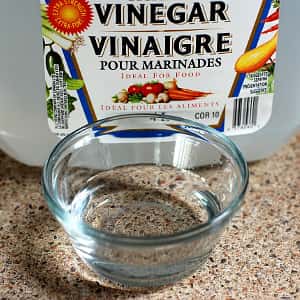
What is your favorite home remedy?
One of the oldest and most versatile remedies known to humankind resides in your kitchen cabinet. It gets very little respect, but science is now discovering why vinegar has been treasured for so long.
The History of Vinegar as a Remedy:
At least 7,000 years ago the Babylonians used vinegar to preserve food. The father of modern medicine, Hippocrates, is believed to have recommended vinegar and honey for a range of health problems.
In the mid 20th century D.C. Jarvis, MD, popularized the use of vinegar and honey in his book, Folk Medicine: A Vermont Doctor’s Guide to Good Health. He recommended a daily drink of eight ounces of water with two teaspoons of apple cider vinegar and two teaspoons of honey mixed into it.
It was supposed to help ease arthritis pain and prevent common health problems. Dr. Jarvis didn’t have the benefits of modern research on vinegar, so he had to use observational skills and his patients’ testimonies in building his arguments for honey and vinegar as a remedy.
The Science Supporting the Use of Vinegar as a Remedy:
Increasingly, there is actual science to show how we can use vinegar to benefit our health.
Blood Sugar:
One of the most surprising effects of vinegar is its ability to moderate the rise of blood sugar after a meal. Recent studies show that taking vinegar with a meal or just before it improves blood flow to the muscles and increases glucose uptake into muscle cells (European Journal of Clinical Nutrition, June 2015; Journal of Diabetes Research, online May 6, 2015).
As a result, blood sugar, insulin and triglycerides do not rise as quickly or as high after a meal as they would otherwise. The effect is most noticeable after a meal that is high in easily digested carbohydrates (European Journal of Clinical Nutrition, July, 2010).
Controlling Cholesterol:
Modulating blood sugar and triglyceride levels helps to lower cholesterol. One reader offered this report:
“I have always had high cholesterol, but my doctor hasn’t insisted on a statin. He knew I would be reluctant to take one. I read about unfiltered vinegar, got a bottle and have been drinking two tablespoons in a mug of warm water every morning for months.
“When I had my annual physical and lab work, the doctor asked what I had done to lower my cholesterol. When I told him, he laughed out loud.
“From January 2014 to January 2015, my total cholesterol went from 291 to 216 and my LDL cholesterol from 164 to 122.”
Although some of the research on vinegar lowering cholesterol has been conducted in rats (Journal of Agricultural and Food Chemistry, June 22, 2011), one recent study in Korea demonstrated that a daily vinegar supplement for six weeks improved blood lipids and lowered inflammatory compounds in overweight teenage girls (Journal of Exercise Nutrition & Biochemistry, Mar., 2015).
Skin Solution:
Vinegar also has a wide range of uses in treating skin problems. It discourages yeast overgrowth, which probably explains why it can be helpful against itchy scalp and dandruff, itchy ears, athlete’s foot and jock itch. Many people have reported using vinegar soaks to get rid of warts and to overcome nail fungus infections.
Vinegar may be one of the oldest, cheapest and most versatile remedies around. Modern medicine might do well to rediscover what Hippocrates knew millennia ago.

